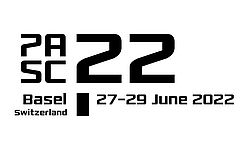The Platform for Advanced Scientific Computing (PASC) Conference brings together domain scientists, computer scientists, HPC professionals, and vendors to talk about some of the challenges and opportunities we face in HPC. Held annually and located this year in Basel, it will be the first time since 2019 that the conference has been in-person albeit with an additional online component too for those who can not travel.

PASC should be especially interesting this year due to the recent news that the Frontier US machine has broken the exaflop barrier, moving us truely into the exascale era. However a key challenge is being able to exploit such supercomputers, and that is where a lot of the focus of PASC lies. Our interests are obviously around using DSLs to raise the abstraction level, enabling programmers to concentrate on the science of their simulation rather than having to be bogged down with the tricky, low level details of parallelism.
To this end we have organised a mini-symposium around DSLs titled Domain Specific Languages (DSLs) for Revolutionising HPC Code Development: A Panacea or Empty Promises? where we will be bringing together some of the community’s leading players to discuss the role of DSLs and how we should be driving forward this important enabling technology.
There will be three talks and a panel session as part of PASC, where we will start with a talk from Chris Maynard from the Met Office who will be talking about the PSyclone DSL used for climate and weather codes (more details here). This will then be followed by Nicolas Vasilache from Google who will talk about compiler innovations more widely and how recent developments and technology trends are very exciting for this area (more details here). The third talk will be from Daniel Shapero, who is a senior research scientist at the Polar Science Center of the University of Washington, and he will be talking from the user perspective around developing libraries on-top of DSLs (more details here). The session will then conclude with a panel where we will discuss some of the themes raised and challenges identified.
The session is running on Wednesday 29th of June between 2pm and 4pm CEST both in-person and online, if you are interested in attending then you can register for PASC here.